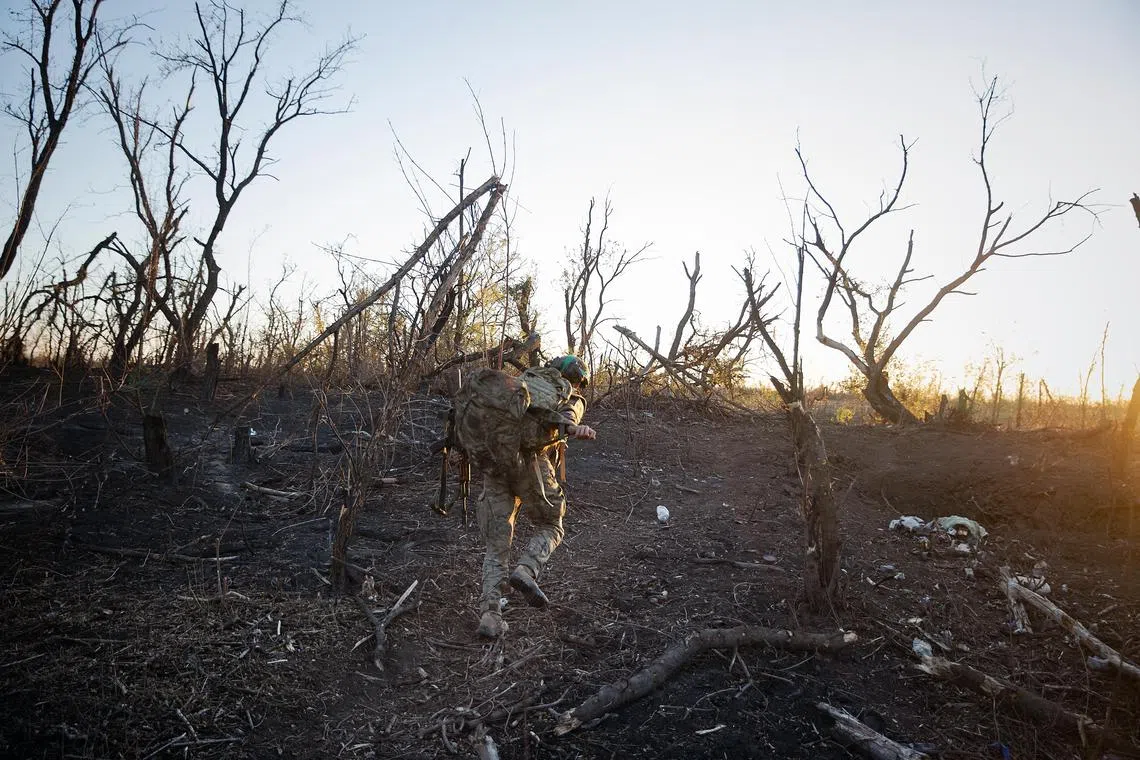US cites new Russian tactics for decision to supply landmines to Ukraine
Sign up now: Get ST's newsletters delivered to your inbox

A Ukrainian soldier outside Toretsk, Ukraine, in October 2024.
PHOTO: NYTIMES
Follow topic:
WASHINGTON - The US decision to send anti-personnel landmines to Ukraine – in a major policy shift slammed by rights groups – was triggered by a change in Russian battlefield tactics favouring infantry over mechanised units, US Defence Secretary Lloyd Austin said on Nov 20.
“They don’t lead with their mechanised forces any more,” Mr Austin told reporters while on a visit to Laos. “They lead with dismounted forces who are able to close and do things to kind of pave the way for mechanised forces.”
The Ukrainians “have a need for things that can help slow down that effort on the part of the Russians”.
President Joe Biden’s reversal of his previous curbs on US landmines
The outgoing US administration is aiming to give Ukraine an upper hand before President-elect Donald Trump enters office.
Trump has repeatedly criticised US assistance for Ukraine, claiming he could secure a ceasefire within hours, without explaining details.
His comments have triggered fears in Kyiv and Europe about Ukraine’s ability to withstand the Russian attacks without US support.
In 2022, Mr Biden said the US would mostly ban its use of landmines, at the time specifically drawing a contrast with Russia’s use of the weapons in Ukraine.
Both Russia and the US – both of which are not signatories to the UN Mine Ban Treaty – have been criticised for their past use of anti-personnel mines.
Ukraine is a signatory of the treaty. A report from the International Campaign to Ban Landmines on Nov 20 said Kyiv was investigating the reported use of anti-personnel mines by its soldiers in 2022, in violation of the treaty.
Threat to civilians
The US said Ukraine would be supplied with so-called “non-persistent” mines that can self-destruct or render themselves inactive after losing battery charge – in theory limiting the risk to civilians.
“Within two weeks, if they have not been detonated, they become inert,” State Department spokesman Matthew Miller told reporters.
He said that Ukraine would need to conduct missions to get rid of unexploded ordnance at the end of the conflict regardless of the new weapons authorisation.
The decision to send mines to Ukraine was immediately slammed by rights groups.
Ms Mary Wareham, a deputy director at Human Rights Watch, said Ukraine’s use of the mines would contravene the Mine Ban Treaty, and questioned the safety of the ageing stocks Washington would be supplying.
“From a clearance perspective, de-miners have to approach any type of explosive object with the knowledge that it may explode,” Ms Wareham told AFP, adding that the self-deactivation feature is “not enough”.
Amnesty International called Washington’s decision “a deeply disappointing setback”, saying “even the ‘non-persistent’ mines are a threat to civilians”.
The Biden administration was similarly criticised in 2023 for supplying Ukraine with cluster munitions.
The landmines will be provided as part of a larger tranche of aid being supplied to Ukraine valued at US$275 million (S$369 million), which also includes Himars rocket ammunition, TOW missiles and small arms.
Battlefield escalation
Both Moscow and Kyiv are jockeying to secure battlefield advantage before Trump assumes office in January.
This week, Kyiv fired US-supplied ATACMS missiles at Russian territory
On Nov 19, Russian President Vladimir Putin signed a decree lowering the threshold for when Russia could use nuclear weapons.
Laos, where Mr Austin made his comments, is still recovering from heavy US bombing during the Vietnam War.
More than 20,000 people have been killed or injured from unexploded ordnance in the half century since that war, according to The Halo Trust, a demining group. AFP

